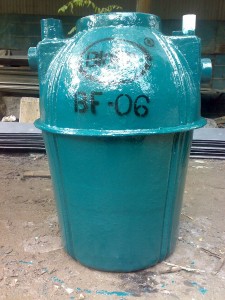Septic Systems or Shared Sewers: Which is More Environmentally Efficient?
Septic systems and sewers are the two systems that handle and treat black water (waste-water) and grey water (sinks, showers, dishwasher water). While you are unlikely to have a choice between the two for your home, unless your septic based neighborhood is petitioning to switch to sewer, looking at the differences in which the two systems dispose of waste is important to understand how contaminated water is treated and sent back to the environment.
In many ways, on site septic systems and community sewers function in similar ways by filtering out viruses, bacteria, and other disease causing pathogens with micro organisms before filtering the water back into the environment. The biggest point of divergence comes from who keeps the system running. In the case of septic system, the individual user must assume most of this burden, whereas a centralized sewer system is maintained by the local government. Here is a quick look at some of the pros and cons of each system regarding the environment.
Shared Sewer Systems
In general, these systems are the preferred systems by most people–presuming there is a choice at all. Since the burden of keeping these system running falls to the local government, the logistics of treating waste-water is not the responsibility of the individual user. Off site waste-water treatment also gives the benefit of dealing with decontamination of waste-water at an offsite facility. Septic system owners who have experienced an overflow can more fully appreciate the advantages of an offsite treatment facility.
These shared sewer systems are also designed to withstand periods of heavy precipitation and storm surges, as well as larger amounts of waste-water that could overwhelm a smaller or poorly maintained home septic systems. The size and physics of these shared sewer systems make them better suited to handle those types of variables–such as heavy rains and larger scale waste processing. Of course, numerous complications can arise with municipal shared sewer systems as well, and breakdowns and calamities like earthquakes or severe flooding can compromise municipal sewer systems and treatment facilities–affecting a great deal more people. Nevertheless, these systems can be ideal for the basic reason that the homeowner does not have to perform regular maintenance and upkeep on the system.
Septic Systems
Home septic systems are the other alternative to shared sewer systems. These systems treat waste-water much the same way as large waste-water treatment facilities–just on a much smaller and more individualized scale. Advocates of home septic systems claim that well designed, installed, and maintained systems can support heavy storms and properly treat waste-water. The key point here is maintenance. Septic systems, like any other sewage system, require regular maintenance to effectively treat waste-water, perform reliably, and avoid adversely impacting the surrounding ecosystem. This maintenance, however, is done by you, the owner.
Improperly treated sewage from septic systems can contaminate surface and groundwater and present a public health threat–spreading bacteria and disease to water supplies, rivers, streams, and lakes–damaging the ecosystem at large. Septic systems can also overflow relatively easily and contaminate your property and nearby areas. For systems that are poorly maintained, this risk is very real and makes septic systems potentially harmful to the surrounding environment if not maintained. Fortunately, you typically don’t have a choice between the two systems so you will know what you get when you move in to your house.


